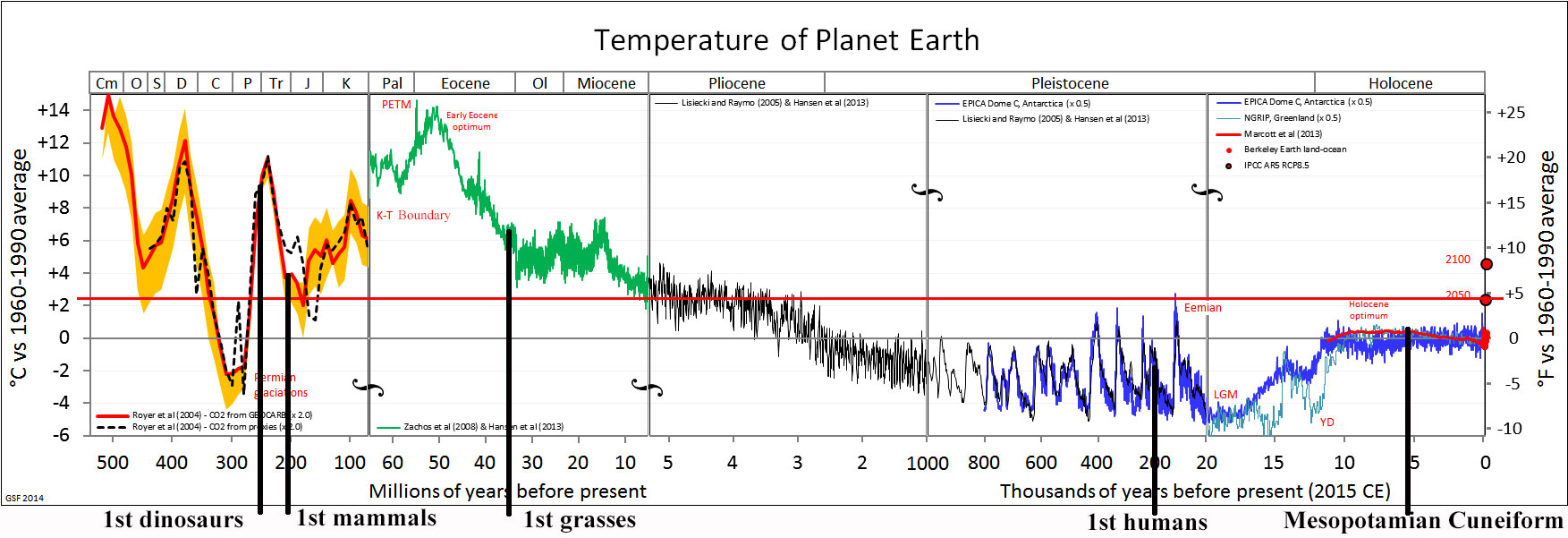
Average Earth Temperatures
This
is a graph of average earth temperatures from the last 500 million years to the
present. We drew the horizontal red line at a temperature level of RFC 8.5, the
IPCC’s estimate of the worst global warming case, if no policies are enacted
and population continues to grow. At current average levels of global warming
(1.2 C° versus an extreme
2.5 C° above the
pre-industrial level) there are already many developing problems with the
weather on all six continents. On this Creative Commons graph, whose data get
more accurate moving to the present day, we have placed the approximate first
appearances of:
· Dinosaurs
· Mammals
· Grasses
· Humans
· Written Culture
(Mesopotamian Cuneiform)
A
climate scientist noted that at elevated temperatures, life on earth will be
fine; but will humans? The first dinosaurs, mammals and grasses developed in
temperatures way in excess of current levels. In contrast,
the first humans developed during relatively temperate times, which descended
into a second ice age. From the above, what is the main requirement of culture?
What keeps everyone from becoming hunter-gatherers or cave dwellers? What does
this graph say to you; this picture
of Iraq?
__
Solutions
to the climate crisis do exist, in the forms of both technological change and
social organization.
An
excellent Bloomberg 7/28/23 article
notes: “The biggest success of the energy transition has come about because of
a simple rule: Make a lot of anything, and it gets easier to make even more at
cheaper prices.” Until the last few years, clean-energy alternatives were too
expensive to compete with fossil fuels. Today solar power costs just 11% of
what it did in 2009. Offshore wind and battery prices fell 74% and 84%
respectively, from 2012 to 2022, BloombergNEF data
shows. “Those plummeting costs (but not permit delays) have pushed global power
prices down to much that dirty fuels no longer make economic sense…There needs
to be a concerted effort to look also at storage solutions.”
But
there is a problem. It is the same problem that many stock market investors
encounter…short time horizons. According
to a Bloomberg 7/26/23 article, “(there are)…growing doubts on the UK’s
commitment to the carbon net-zero target of 2050. Higher borrowing costs and a
cost-of-living crisis are pressuring political parties to consider watering
down climate policies that may burden consumers ahead of a general election due
before the end of January 2025. Prime Minister Rishi Sunak said earlier this
week he would delay or abandon environment policies if they led to direct costs
to consumers…” The 7/28/23 Bloomberg article published an estimate that the cost
of capital investment to give the world a chance of staying within 1.5 C° by mid-century is a
“head-spinning: $196 trillion.” In contrast, the world economy’s 2022 GDP was
around $105 trillion. To tie things together, if you worry about the next
generation’s vocation or its SAT scores, you must also worry about the average
earth temperature.
Government
will have to arrange market forces to advantage environmental investment. It
took FDR several years to build the public support for the U.S. to enter WW II.
*
This article started out as a presentation of an
interesting result. It turned out to be more timely.
The Guardian (U.K.) 7/25/23
“The results makes it crystal clear
human-caused
global
heating (note the choice of words) is already
destroying lives and livelihoods across the world,
making the
need to cut emissions more urgent….
‘There is a rapidly closing window of opportunity to
secure a
livable and sustainable future for all.’”
Incipe currere!
*
8/3/23 Akshat Rathi, Bloomberg reporter and PhD in organic chemistry from Oxford
was interviewing Kim Robinson, author of the noted sci-fi novel, “The Ministry
for the Future.” The interviewee asked the interviewer, whether things were
getting better. The answer was, “yes.” “I’ve been a climate journalist for
seven years now…every year has been a completely different year…either the
subject is so vast that it does just take that much time…(or-inclusive) the
world in that period has done so much. That we have gone from a world where
temperatures of 5 to 6 degrees Celsius, were completely within the realm of
possibility by the end of the century…Now we are looking at 3 degrees Celsius
which is a pretty bad scenario, but that is not the dystopia that (could have occurred)…the direction is better than it was a few years
ago.” The above motto is still a very good idea.